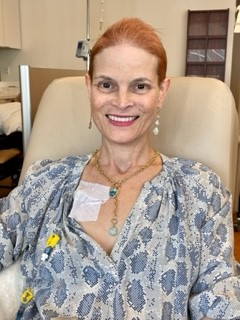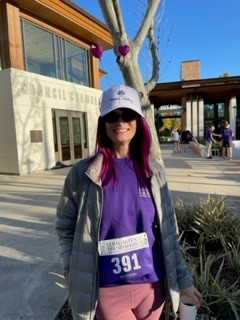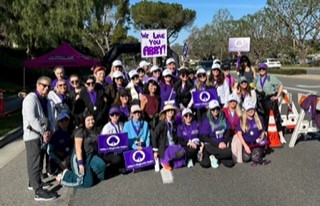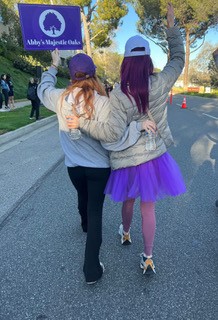A Mantra and a Mindset
Topic: Announcement, Hide on Homepage, Real Talk: Survivor, Patient & Family Stories, Your Source for Breaking News & Inspirational Stories

Last fall, Abby Maxam’s doctor noticed something unusual on the radiologist’s report from her routine chest scan: a spot on her pancreas. In fact, it’s uncommon for the pancreas to even be seen on a chest scan. Her doctor assured her the spot was likely nothing worrisome, but recommended she see a gastroenterologist, who then sent her for an MRI. The MRI revealed a large mass on her pancreas. When the doctor broke this unimaginable news to Abby on November 1, she was so stunned that at first, she thought the doctor was speaking to someone else! Abby was just 52, lived an active lifestyle, exercised, and ate a healthy diet.
Once Abby was diagnosed, things moved incredibly quickly. Within a week, she started chemotherapy infusions with FOLFIRINOX. She persevered through 10 rounds of the difficult treatment, but her tumor unfortunately didn’t shrink as much as her doctors had hoped. She is currently undergoing treatment with another standard-of-care treatment combination, Gemcitabine/Abraxane, and managing side effects including neuropathy, fatigue, hair loss, and “chemo brain,” but she remains laser-focused on her goal: Push through the treatment to shrink her tumor enough so she becomes eligible for the Whipple surgery—which offers the best chance for a cure. Abby envisions her journey as chapters in a book. Right now, she’s moving through the chemotherapy chapter, which she hopes will be followed by a surgery chapter and finally, a recovery chapter.

Looking back, Abby now recognizes some of the changes she noticed in her body leading up to her diagnosis were caused by her cancer, although she didn’t know that then. Her doctors also never mentioned any association between her symptoms and the possibility of pancreatic cancer. Throughout the summer and fall, she was feeling fine, although she was unable to gain weight, despite trying to. She also experienced intense back pain that radiated down her leg. Then in early October, Abby had other signs something was wrong. “I felt like my body was speaking to me, telling me to slow down,” she remarked. Plus, her uncle had passed away from the disease 30 years ago, when he was only in his 50s.
Perhaps the most concerning early symptom was her diagnosis as a pre-diabetic when she was only 44, several years before she learned she had pancreatic cancer. Doctors were puzzled as to how someone as young, physically fit and health conscious as Abby could be pre-diabetic, and they kept increasing the dose of metformin to control her blood sugar. “I want people to know they should ask their doctors about getting their pancreas checked if, like me, they develop pre-diabetes or diabetes suddenly, with no other risk factors,” Abby emphasized. “The connection between sudden onset diabetes in adults and pancreatic cancer can’t be emphasized enough and is a huge red flag.”
Abby’s family, including her husband, 20-year-old daughter and 16-year-old son, have been incredibly strong, supportive, and resilient. Like her, they were in shock and disbelief when she was diagnosed, but they are determined to envelop her in a cocoon of love, positivity, and hope. “My incredible medical team mentioned that while 50% of getting through this disease is the treatment, the other 50% is the power of optimism and hope and surrounding yourself with positive energy,” Abby said. “I need to be here for my kids. I’m going to recover and be cancer-free.”
Abby has practiced meditation for many years, and she’s found that meditating every morning has been the best coping mechanism throughout her treatment. It empowers her to deal with whatever the day brings, whether it’s multiple doctors’ appointments, hospital visits, medication infusions, side effects, or just the constant stress and uncertainty of navigating such a challenging disease.

“When I meditate, I imagine I am an oak tree because an oak tree is fully rooted in the ground and withstands all weather. It remains strong, no matter what comes its way, and I want to be like that,” affirmed Abby. A key part of her meditation involves envisioning the cancer cells leaving her body. She repeats her mantra, “I’m healthy and cancer-free,” until it becomes something she truly believes. “It’s so easy to distrust hope, but there’s nothing more important for facing pancreatic cancer than maintaining it, being optimistic and giving yourself the grace and the space to experience whatever you’re feeling, both physically and emotionally.”
Abby has found it’s a blessing to remain focused on the present and take things one day at a time, rather than always look ahead to another point in the future, as her family had done prior to her diagnosis. Being in the present keeps her grounded and her whole family thankful for the everyday, small moments they have together. She also has been supported by so many loved ones and friends, who have been inspired by her story and her unwavering outlook.

As she continues her treatment, she is incredibly grateful for the support of the Lustgarten Foundation. Abby’s close friend contributed to the Foundation in her honor and learned that 100% of every donation funds the most cutting-edge research into earlier detection, new treatments, and personalized medicine. After learning about the Foundation, Abby wanted to get involved. She discovered the Foundation’s Westlake Village Walk for Pancreatic Cancer Research, taking place right near her home in California. She organized Team Abby’s Majestic Oaks, inspired by her vision of herself as an oak tree. The team had more than 200 donors and 65 walkers and raised nearly $71,000 for research!
After the walk, Abby hosted a celebratory brunch, where she distributed candles for healing and asked her family and friends to light these candles and picture her making a full recovery. She soon had friends from around the country and the world lighting candles for her—what she calls “lights of hope.” Lighting candles enables loved ones to feel connected to Abby and help when they don’t know what to do; the thought of everyone sending positive energy to Abby nourishes her spirit and motivates her to fight even harder not just for herself, but for the thousands of others impacted by pancreatic cancer.

“I don’t want anyone else to be blindsided by a pancreatic cancer diagnosis like I was. Health professionals need to learn early clues that are being missed in pancreatic cancer—like the pre-diabetes in my case. And of course, we also need dedicated, innovative researchers to discover new, effective treatments for people like me who are in the midst of this disease,” said Abby.
“Every patient is so unique, and their treatment path is different, but more than anything, we all just want a cure and the opportunity for more precious time with our loved ones.”

